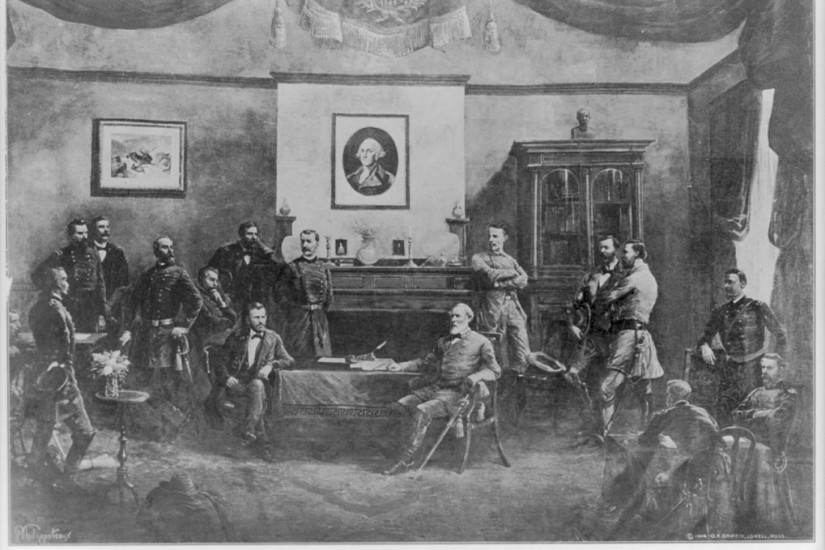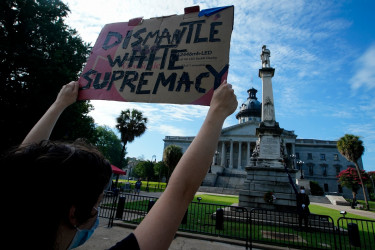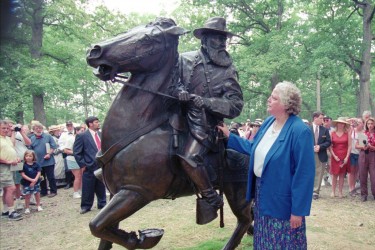Protesters may have toppled “Silent Sam,” a Confederate monument at the University of North Carolina at Chapel Hill, last week, but the university has vowed to reinstall it. Two hundred miles north, the figure of Gen. Robert E. Lee still stands tall in Charlottesville, even after its potential removal inspired a deadly march by white nationalists last summer. Debates continue to rage over the Confederate memorials littering the nation’s landscape. Shall we topple, relocate, repurpose or reinterpret them — or leave them unchanged?
Protesters know that the vast majority of these statues were Jim Crow-era monuments, intended to celebrate the triumph of white supremacy and to remind African Americans of that triumph decades after the Civil War.
But the roots of these memorials reach even deeper, back to the very moment that a bloody, four-year war ended the legal institution of racial slavery. Vanquished Confederates chose to see the end of black slavery as the beginning of white persecution and victimization. A similar equation animates white-nationalist movements today. Indeed, the problem of Confederate monuments points to a larger, persistent conviction among some white Americans that racial equality brings white oppression in its wake.
In Charlottesville in 1865, mere weeks after Lee’s surrender, a white woman wrote a letter to her aunt. “All is darkness & gloom,” she lamented, describing her people as “trodden down under the heel of the oppressor.” Declarations like this one echoed across countless personal writings of defeated Confederates, whether they had owned slaves or simply reaped the benefits of whiteness in a society grounded in black slavery and white freedom.
Former Confederates were deeply depressed in the weeks and months after the war. As a private in Lee’s army wrote in the closing pages of his wartime diary, “Ah! what hardships, what sufferings, what trials, what deaths, what sorrows, what tears, what great losses both of men & of property” — that last word referring to the devastated landscape and emancipated slaves alike. Some even contemplated suicide. The woman in Charlottesville put it rather genteelly: envying the battlefield dead, she wished for her “earthly pilgrimage” to be “shortened.”
Over and over, white Southerners explained their despair by expounding on the loss of their freedom, with nary a mention of more than 200 years of black slavery. “Nature weeps over Liberty’s death,” a Confederate soldier wrote in his diary the day after surrender. White Southern men and women now described themselves as “subjugated,” a word that appears with astonishing frequency in their end-of-war letters and diaries. Theirs was “a subjugated country,” one said. It was a “dreadful time of our subjugation,” another said. For one postwar refugee, “Subjugation, with all its horrors stares us in the face.”
Even more graphically, overthrown Confederates believed that emancipation for African Americans led inevitably to white enslavement.
This language — of subjugation and slavery — was not metaphorical. Neither was it unintentional or unthinking. Anyone alive in the antebellum South understood full well the literal brutality of enslavement. After the war, a Georgia man was convinced that his people were “in a bondage worse than slavery.” That whites could cast themselves as a people in bondage indicates just how viscerally the crumbling of white supremacy terrified them. Like enslaved African Americans had, a woman in Virginia prayed to God that someday her people would “be free.”
Mired in anxiety, many former Confederates refused to give in to black freedom, vowing instead to replicate the conditions of black slavery: coerced labor, limited mobility, no political rights. A Texas surgeon told his wife that the mere thought of “a ruined country, Negro equality and the mortification of defeat” would fire up the will to “fight on a little longer.” Even as the battlefields lay deserted, a woman promised her diary, “We’ll await our opportunity and try them again.”
African Americans well understood the determination of white Southerners in the immediate aftermath of Union victory. Former slaveholders would “lay down their arms to-day,” wrote the editors of the New York Anglo-African a few days after Lee’s surrender, “in the hope of taking them up again at a future day” to “resume the struggle with larger hopes of success.”
Nor were slaveholders the only enemies. The same newspaper noted that “poor and ignorant” white people in the old slave states were unlikely to be “emancipated from negro-hate.” Reminding the nation that they had served the Union cause, African Americans sought ownership of land for their families and voting rights for black men.
But defeated Confederates ensured that the gains of Reconstruction would not endure. In the name of white freedom, they terrorized black Southerners with tactics ranging from the destruction of property, to whipping and maiming, to castration, rape and murder. The defeat of Reconstruction in 1877 would usher in a long era of segregation and disfranchisement, with many weary white Northerners relieved to reconcile with their former foes. That’s when Confederate monuments went up in earnest, carving white supremacy in stone.
The dread of racial equality lay at the root of the violence in Charlottesville last summer, a dread that can be traced directly to Union victory and black freedom. A month after Lee’s surrender, a white woman listened with dismay to the “vile talk” of the Northern soldiers occupying her Virginia town. “In a few years,” they told her, “we will have a negro President.” For those who equated black freedom with white subjugation, that constituted the ultimate horror.
It would take nearly another century and a half for the United States to elect a black president. Less than two years after the end of President Barack Obama’s second term, the nation faces a mighty resurgence of white horror at the still-elusive possibility of racial equality.











